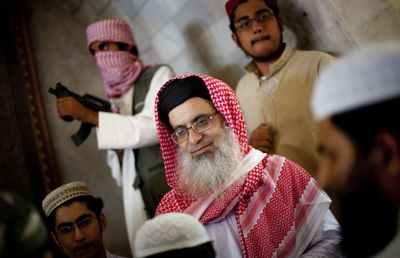Freed radical cleric seeks Islamic law for Pakistan
Out on bail, Aziz draws thousands to mosque

ISLAMABAD, Pakistan – A firebrand Islamist cleric, released on bail after almost two years under house arrest, returned triumphantly Friday to his former mosque in Pakistan’s capital, where he called on a crowd of chanting followers to spread the crusade for Islamic law nationwide.
Thousands of men and boys in turbans and tunics streamed toward the Red Mosque, the site of a bloody confrontation with Pakistani security forces in July 2007, to hear Maulana Abdul Aziz invoke the martyrdom of those who died in the military siege and urge others to sacrifice their lives for Islam.
The gray-bearded Aziz, who arrived under police escort, stopped short of calling for violence and described his cause as a “peaceful struggle.” But there was an implicit threat in his message and a mood of barely suppressed eagerness for action in the crowd.
“If the government wants peace and stability, it should adopt the Islamic system,” Aziz said. “But if it chooses the path of aggression and force, it will further aggravate the situation.”
The bombastic Aziz, who took over the Red Mosque after his father’s assassination in 1998, is known for his hard-line religious views. In fiery speeches to followers over the years, he has advocated the strict separation of men and women in accordance with rules that he says are set forth in Islamic law. He once issued a fatwa, or religious edict, against a female government official for publicly hugging a man who was not her husband.
Aziz and his brother and deputy, Abdul Rashid Ghazi, had also supported the Taliban’s rise to power in neighboring Afghanistan in the 1990s, according to Pakistani officials. By 2007, they were committed to turning Pakistan into a Taliban-style Islamic state. In the months before the standoff, in which Ghazi was killed, the two clerics initiated a string of actions to provoke the government, including stockpiling weapons in their compound and sending students from the mosque’s religious school out on moral vigilante missions.
On Friday, Aziz and other speakers hailed the imposition of Shariah law in Pakistan’s northwestern Swat region, which Parliament and President Asif Ali Zardari approved Tuesday in an effort to mollify extremist Taliban forces who have waged a terrorist campaign there for the past two years.
Pakistan is a Muslim nation but not a theocracy. Shariah courts and laws do exist, but they deal largely with religious and moral issues and do not supersede other courts.
A growing number of religious groups in Pakistan seek to make Shariah the exclusive form of national law.
Aziz’s unexpected release Thursday, just two days after the government approved Shariah rule in Swat, appeared to signal what analysts have called an alarming trend of official appeasement of radical Islamist forces as they flex their muscles in ever-widening regions of Pakistan. Aziz, who still faces at least 26 charges, denied he had made a deal with the government, and it was not clear why the Supreme Court freed him on bail.